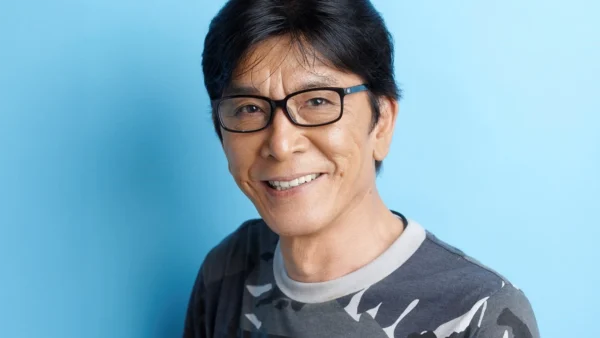Jōji Nakata: Velvet Thunder in a Microphone
Some voices slam the door. Jōji Nakata’s opens it with a courteous bow and a low, resonant “Do come in,” before revealing a labyrinth of conspiracies, ancient grudges, and occasionally a very large sword. Born in Tokyo and trained as an actor before pivoting into voice work, Nakata became one of Japan’s most unmistakable vocal presences—an urbane menace and warm storyteller in equal measure. If you’ve ever felt pleasantly threatened by a character’s good manners, there’s a decent chance Nakata was behind the curtain.
The Early Footing: Stage Bones, Studio Ears
Nakata’s bedrock is straight acting—the kind that gives you posture and projection before you ever see a pop filter. That foundation shows up everywhere in his voice career. He shapes a line like a stage actor, placing consonants with precision and saving the big air for moments that truly need it. The result: vocal performances that feel both theatrical and intimate, like a soliloquy delivered just for you.
The Vampire Who Didn’t Need to Shout: Alucard in Hellsing
When Nakata took on Alucard in Hellsing and Hellsing Ultimate, he gave anime one of its great paradoxes: a vampire who sounds more alive than most mortals. His Alucard doesn’t bellow; he luxuriates. The performance rides deep vowels and sardonic pauses, turning every taunt into a velvet rope. Even during the show’s ballistic crescendos, he never loses the sense that Alucard is having a grand time—and that you should be a little worried that you are, too.
Priest, Philosopher, Problem: Kirei Kotomine in Fate
Then there is Kirei Kotomine, the philosophical antagonist threading through the Fate universe. Nakata’s Kirei sounds like an ethics professor who grades on a curve only he understands. The voice is measured, almost kind—until it isn’t. His performance sketches a man who could pass the tea politely and talk you into catastrophe before you notice the saucer shaking. Across Fate/stay night, Fate/Zero, and Unlimited Blade Works, Nakata sustains that balance of calm inquiry and ruthless certainty, making Kirei one of anime’s most quietly terrifying minds.
The Count Who Counts: Gankutsuou’s Monte Cristo
In Gankutsuou: The Count of Monte Cristo, Nakata voices the titular Count, a gentleman-avenger wrapped in couture vengeance. The role demands aristocratic poise and subterranean fury; he delivers both with silken restraint. You hear the weight of years in the low register, the gleam of calculation in the clipped endings of sentences. It is revenge as chamber music.
From Battlefields to Bureaucrats: Range in the Middle Registers
Nakata’s resume wanders with purpose. As Diethard Reid in Code Geass, he embodies the media strategist whose devotion to narrative outpaces his morality; as Amshel Goldsmith in Blood+, he slides into aristocratic predation with unsettling grace. In SoltyRei, his Roy Revant carries a battered tenderness—gravel with a conscience. And then there’s Sgt. Frog (Keroro Gunso): as Giroro, Nakata distills military bark into comedic timing, proving that discipline can, in fact, be hilarious.
Cat, Chef, Gentleman: Nyanta in Log Horizon
Few roles showcase his genial warmth like Nyanta in Log Horizon. The character is a suave, soft-spoken mentor, equal parts culinary sage and raid tactician. Nakata’s performance gives Nyanta a purr of reassurance—precisely articulated, never cloying—so that even the most chaotic dungeon crawl feels like supper with an old friend who happens to wield a rapier.
When the Sea Roars Back: Hody Jones in One Piece
On the other end of the spectrum sits Hody Jones, the shark-toothed extremist of One Piece. Here, Nakata leans into menace edged with zealotry—the cadence clipped, the vowels sharpened. It’s a study in ideological hunger: the sound of a man convinced he is history’s tide, even as it drags him under.
Narrators, Dignitaries, and Other Authorities
Nakata is as potent when he tells you a story as when he inhabits one. His narration work—documentary segments, previews, omniscient voices—has the patient clarity of an expert witness who also appreciates drama. The same authority colors his dignitaries and commanders across series: Tokugawa Ieyasu in historical epics and game adaptations; shadow operatives and boardroom tacticians who rule with phrasing as much as power.
Game Worlds: When Timbre Decides the Tension
Video games have long understood what Nakata brings: intelligibility in chaos. Boss fight? You still catch every word. Mid-battle philosophy? He lands it without slowing the combo. As Van Grants in Tales of the Abyss, he gives the mentor-turned-antagonist a gravitas that makes ideology feel weighty, not windy. As Margulis in Xenosaga, there’s steel under the prayer. His turns in sprawling franchises—from Kingdom Hearts to the Trails series—are case studies in how a voice can carry lore without sounding like a manual.
The Craft: How He Does It
Listen closely and you can map Nakata’s toolbox. He trims breath until the line sits flush against the beat, a technique that reads as confidence. He keeps sibilants tight—no hiss unless he chooses it—so menace never becomes noise. And he is fond of the micro-pause: that tiny half-beat before a key noun or verb that makes the word glow. Directors can build whole scenes around that timing, because the audience will follow it without knowing why.
The Long-Running Japanese Voice of Albert Wesker
If you’ve ever switched your Biohazard games to Japanese and felt a familiar chill when the sunglasses entered the chat, that’s because Jōji Nakata has been the franchise’s steady hand (and steady baritone) behind Albert Wesker for years. In Japanese releases and dubs of the series’ video games, Nakata is the established voice of Wesker—spanning core titles and notable spin-offs such as Biohazard HD Remaster, Biohazard 0 HD Remaster, Biohazard Revelations 2, and Biohazard RE:4, as well as crossover appearances like Ultimate Marvel vs. Capcom 3 and TEPPEN. The through-line is simple: when Wesker speaks Japanese, it’s overwhelmingly Nakata.
That consistency matters. It’s why the character reads as the same urbane schemer whether he’s monologuing over viral destiny or dropping in for a stylish cameo. For a concise, high-level confirmation of this long-running association, see the overview on Albert Wesker (Wikipedia).
A Voice with Good Posture
There’s a physicality to his reads that betrays stage habits—in the best way. You can almost see the spine align on a declarative line from Kirei, or the shoulder drop on an amused aside from Alucard. That posture translates to microphone distance and head angle, which in turn shape tone: a bit of proximity for intimacy, a fraction more space for arched irony. It’s not mystical; it’s craft practiced to the point that it feels effortless.
Comedic Cool
While fans rightly celebrate his villains and statesmen, Nakata’s comedy is a quiet marvel. As Giroro, the joke lands because the character takes everything too seriously; as Nyanta, the humor is dry—seasoned, not sauced. He knows that the quickest way to make a line funny is to make it true and let the situation do the work.
Longevity Without Repetition
Many long careers calcify into a single “type.” Nakata escapes that fate because he treats type as a set of choices, not a sentence. His antagonists are not interchangeable; each has a distinct rhythm. Compare the unhurried relish of Alucard to the moral geometry of Kirei or the brute zeal of Hody Jones. The palette is similar; the painting is not.
Influence and Echoes
It’s not an exaggeration to say that Nakata helped codify a modern template for the elegant anime antagonist: precise, persuasive, and perversely reasonable. You can hear echoes of that template across newer series and games—villains who try charm before chaos, monologues that sound like arguments you wish you could refute more easily. He didn’t invent the archetype, but he made it feel definitive.
Why Directors Keep Calling
Reliability. Musicality. Diction you can set a metronome to. And that rare ability to make exposition feel like a secret rather than a lecture. Whether voicing a centuries-old vampire, a priest who argues like a logician, a soldier with a sense of shame, or a cat who can cook, Nakata brings a professional steadiness that lets the rest of the production go a little braver.
The Present Tense: A Voice that Keeps Evolving
Even decades in, he still finds new corners to illuminate: narrations that flex restraint, new game roles that thread tactical chatter with character, ensemble work that leaves room for younger voices while anchoring the scene. If longevity is a conversation between talent and taste, Nakata’s answer remains, “Yes—provided we pronounce it properly.”
One Door, Many Rooms
Summon a mental hallway: on one side, gothic gunfire; on the other, techno-mystic conspiracies; ahead, a warm kitchen where a cat cooks; behind you, the ocean, loud with revolution. Open any door. Chances are, Jōji Nakata is already there, holding it for you with a small smile and a line that lands exactly where it should.
Learn more from his official agency profile: Office Osawa – Jōji Nakata.









